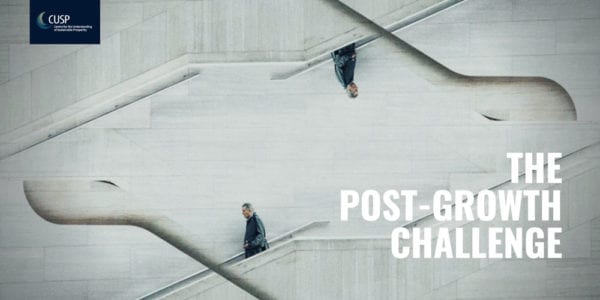Our Future in the Land
The Food, Farming & Countryside Commission with CUSP director Tim Jackson as Commissioner and Chair of the Research Advisory Group have published their final report, calling for radical 10-year plan to transition to sustainable food system with more government support for healthy produce.
July 2019
The UK must completely transition to a sustainable post-Brexit food system by 2030 or face further climate breakdown and the continued rise in diet-related ill-health, according to the final report of the major RSA Food, Farming & Countryside Commission led by one of the UK’s leading business figures.
The two-year independent inquiry was sponsored by the Esmée Fairbairn Foundation with additional support from research organisations (including CUSP) and engaged in an extensive consultation of all players in the food and farming system. The inquiry has looked at how policy, business and community currently shape our food and farming systems and rural communities—what works, what doesn’t and how a more integrated and inclusive approach would drive radical change over the next ten years.
Chaired by Sir Ian Cheshire alongside senior figures from across industry, and supported by an interdisciplinary team of leading researchers in the field, Our Future in the Land sets out a blueprint for the UK’s food, farming and countryside system as the UK is set to leave the European Union. The UK risks further “deforestation, loss of wildlife, soil degradation, widespread pollution and rocketing diet-related ill-health”, the analysis warns, adding that “instead of being the sector that nourishes people, and the land on which we all depend, it has damaged and depleted our precious and finite resources”.
The report proposes an ambitious ten-year transition plan to sustainable agro-ecological farming by 2030, warning that the UK today ranks just 24th in the Economist Intelligence Unit’s global Food Sustainability Index. The companion publication, Field Guide for the Future, showcases innovative actions and initiatives that can both prefigure and build a better future—in it many stories and insights are being shared from numerous inquiries around the UK, where people have already taken up the challenge and are bringing that future to life.
As CUSP Director Tim Jackson, one of the commissioners on the study, pointed out, “when workers in the food industry have to visit food banks to support themselves and their families, you know there is something badly wrong with the economics of the food and farming system. Nothing we’ve pointed out here is rocket science. On the contrary, it’s the bare minimum we should be doing to protect the underlying basis for our lives and our livelihoods.”
Sue Pritchard, director of the Commission, concluded: “The climate and ecosystem emergency are not the only crises we face. The scale of the public health challenge is also dawning on us, from poor diets and mental health, to the effects of pollution and antibiotic resistance. What we eat, and how we produce it, is damaging people and the planet.”
“Our extensive consultation … found that food, farming and countryside policies are currently too fragmented to progress fast enough and far enough. In every country, agriculture policies are disconnected from health policy; environment policy is disconnected from trade policy; social policies are disconnected from industrial strategy.
“As the UK is set to leave the EU, only through radical government action in a real partnership with business and citizens, can we take this opportunity to overhaul our system for the better. Our report proposes exactly this blueprint and we urge government to take action.”
Launch event
The report was launched on 16 July 2019 in London. Environment Secretary Michael Gove addressed the launch alongside Henry Dimbleby, newly appointed to develop a National Food Strategy. The event was recorded and can be watched via the RSA Youtube Channel: https://www.youtube.com/watch?v=iG6tWwj8p8U.
Download
The report and field guide can be downloaded from the FFCC website.



